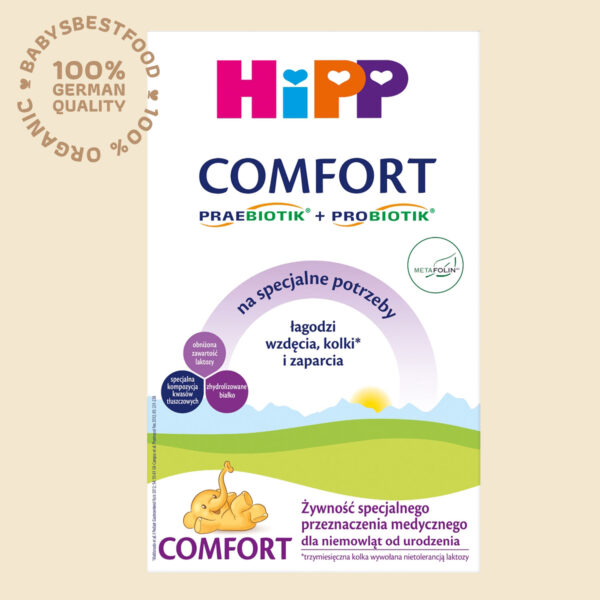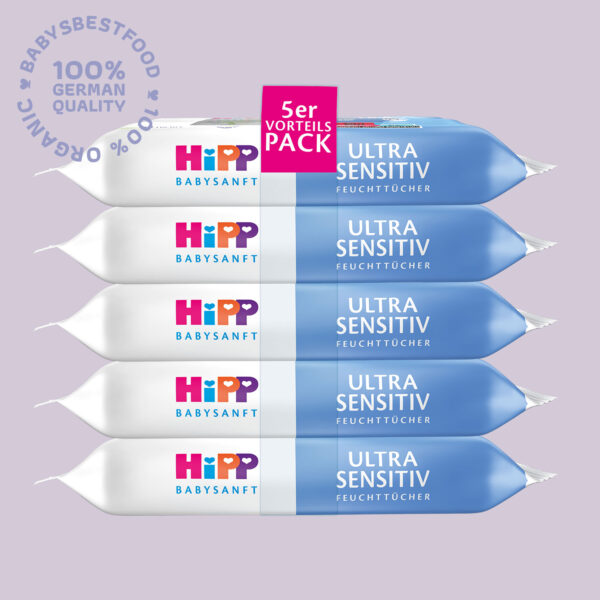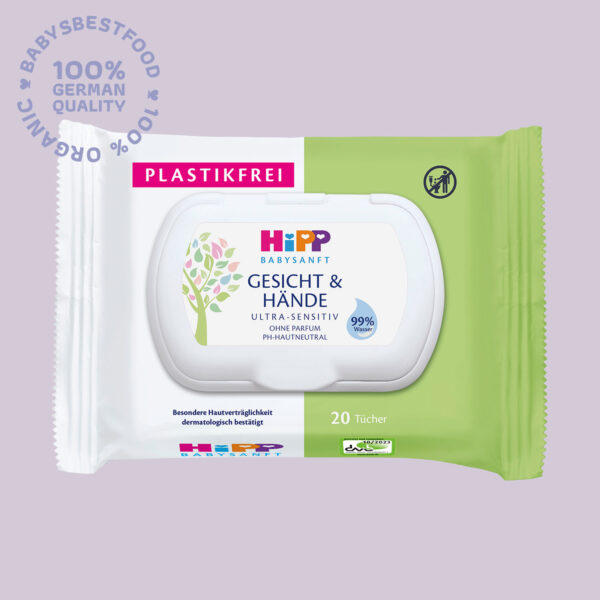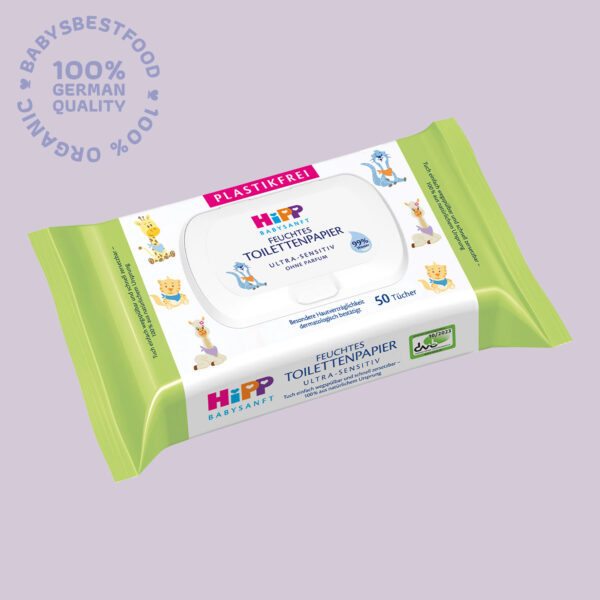Organic Sensitive Baby Formula for Delicate Tummies
If your baby has lactose intolerance, allergies or a sensitive stomach, you know the challenge to find a formula your baby likes. Sensitive formulas are suitable for babies and infants with intolerances, allergies or an upset stomach while still containing all the nutrients a growing infant needs for a healthy development.
Holle A2 Stage 1 – Organic Infant Formula
$77.25 / kg
Holle A2 Stage 2 – Organic Follow-On Formula
$77.25 / kg
Holle A2 Stage 3 – Organic Follow-On Formula
$77.25 / kg
HiPP German Comfort – Colic Support Formula (EU)
$99.67 / kg
HiPP German Anti-Reflux – Special Formula
$63.17 / kg
HiPP German Comfort – Colic Support Formula
$63.17 / kg
HiPP UK Anti-Reflux – Special Formula
$58.63 / kg
HiPP UK Comfort – Colic Support Formula
$58.63 / kg
Kendamil Comfort – Colic Support Formula
$61.13 / kg
What is Sensitive Formula?
To more closely resemble breast milk, sensitive formulas are often lactose-free or include only a small amount of lactose. Additionally, the ratio of whey to casein in sensitive formulas is typically higher. Also, they may comprise partially digested whey protein (Gerber Good Start), which is believed to be simpler to digest and may result in less gas formation. Several of these formulas could also feature prebiotics and probiotics. Both prebiotics and probiotics can potentially reduce gas and signs of colic.
The sensitive baby formula may be aimed more particularly toward babies who have sensitivity to milk and lactose and contain nutrients that support sensitive systems. You should read the label on the baby formula to completely understand the components contained in the infant formula.
If your child has lactose intolerance, allergies, or a sensitive stomach, you are aware of the difficulty of locating a formula that your child will consume. Formulas designed for babies and infants with intolerances, allergies, or an upset stomach are referred to as sensitive formulae. These formulas provide a growing infant with all the nutrients necessary for healthy growth.
Every single formula and every child born is unique. Remember that the things that are successful for other newborns may not be appropriate for your child. However, there are still certain elements that you should take into consideration while selecting the optimal formula for your infant. Regardless of the type or brand of infant formula you decide to give your child, you should always be concerned for their safety.
When Should Your Baby Switch to Sensitive Formula?
Diarrhea, increased flatulence, and increased fussiness are some of the symptoms that may indicate the need for a sensitive formula.
Babies with problems digesting lactose or who are lactose intolerant frequently do well on a formula designed for sensitive stomachs.
When it comes to our children, we always want to make the best decision possible, and the food we provide for them is not an exception to this rule. So many different things cause us concern: Are we using the appropriate formula for their food? Do you think that they are receiving the right quantity?
Standard formulae are sufficient for most infants, although, on occasion, a different kind will be required. Your choice to select a sensitive formula for your baby can be helped along if you are aware of the symptoms to look out for and consult with your baby’s pediatrician.
Here are symptoms that will force you into choosing sensitive formula for your baby;
Diarrhea
If you observe an increase in the number of stools your baby is passing, this may be a sign that your baby is suffering from diarrhea. Diarrhea can be difficult to diagnose. Additionally, diarrhea can be indicated by feces that are looser than normal. Diarrhea can be brought on by your child’s inability to digest the formula properly, which might happen from time to time. This is especially important to keep in mind if the infant has trouble digesting lactose.
If you suspect your child may have diarrhea, you should make an appointment with their pediatrician as soon as possible. An intestinal illness is another possible reason for loose stools that are passed often.
Extra gas
The presence of flatulence in an infant is often completely normal. Because their digestive system is not yet fully matured, passing gas may require additional straining and grunting, particularly for younger babies. It’s possible that ingesting too much air while sobbing or nursing could cause abnormal gassiness.
On the other hand, if your kid has more gas than usual, and it’s not because they’re swallowing too much air, it could be because they’re having trouble digesting lactose.
The presence of excess gas can cause the abdomen to appear swollen and feel tight. Your child’s pediatrician will be able to advise you on whether or not you should move to a sensitive formula or a lactose-intolerant formula.
Extra fussiness
Babies typically exhibit some level of fussiness, particularly in the evenings. Talk to your child’s pediatrician if you notice that your infant is irritable throughout the day, especially after feeding. If your infant displays this kind of regular irritability, it may be a sign that he or she is not responding well to the formula you are feeding them.
Your infant’s fussiness may be their method of communicating discomfort when they are suffering symptoms such as gas and bloating, like those brought on by lactose intolerance. After you have fed your baby, you may notice these signs anywhere from a few minutes to a couple of hours later.
Sleeping challenge
In the same vein as the factors that can cause your infant to be fussy, the fact that they are uncomfortable or hungry can also disrupt their usual sleep rhythm. If your infant is not sleeping as much as they should be throughout the first few months of their lives and you notice something is different with this situation, the problem may lie with the baby food you are giving them.
It is crucial to evaluate how their formula may contribute, particularly when problems sleeping are accompanied by overall fussiness and other indicators of pain or displeasure during the day. At this point, you may want to consider using sensitive baby formula.
Rashes
The skin of infants is extremely delicate and, depending on their surroundings, can undergo daily transformations. The skin’s appearance and texture are susceptible to environmental factors such as temperature and humidity.
Alterations to the skin, such as the formation of rashes, can also be brought on by reactions to the formula. It is always better to consult your child’s pediatrician if you find a new rash growing on your child and you are unsure of what could be causing it. The baby’s skin may adversely react to the formula, so you’ll need to switch to sensitive infant formula.
Wheezing
If you notice that your infant is wheezing after eating, this is almost often a sign that the formula is creating mucus to develop and causing irritation in the chest. If this is the case, this is not a typical reaction to eating, and there should be some adjustments made to the recipe.
In addition, symptoms such as wheezing or a rash may indicate that your infant is experiencing an allergic reaction to one of the formula’s components. Milk from cows and soy products are two examples of common allergies. You must seek immediate medical assistance if your child has trouble breathing while eating because this reaction may indicate a more serious underlying problem.
Vomiting
At some point throughout infancy, every infant will experience spitting up after eating. This is especially common during the initial stages of solid food and/or breast milk consumption. This is to be expected. When a baby routinely throws up after eating and appears uncomfortable with the experience, this is a more telling sign that there may be a problem with the infant’s formula.
For example, if your infant is violently vomiting in a manner that indicates its body is attempting to rid itself of anything, you should seek medical attention immediately. This is a more urgent cause for concern as your baby’s vomiting breastmilk causes distress and prevents them from acquiring the necessary nutrients and fluids from their meals. At this point, you might want to think about switching to a sensitive baby formula instead.
What Are the Benefits of European Sensitive Formula?
Offers parents freedom
During the nine months, while carrying their babies, moms have already given their babies access to their bodies. Sensitive formula feeding allows mothers to regain their freedom and relieves stress associated with deciding what to eat and dress.
Convinience
Have you ever considered giving your baby a formula designed for sensitive stomachs? If this is the case, then you are in a position to attest to the ease and comfort that comes with using infant formula. No more hauling about a pump and all of its components, no more looking all over the house for a pumping bra, and no more wasting time while connected to it. You only required a couple of scoops of the delicate mixture, some water, and a bottle, and you were ready to go.
Essential baby nutrients
If your child is on formula, you won’t need to be concerned about providing them any additional vitamins, as is sometimes recommended by medical professionals for infants who are breastfed. Iron and vitamin D is often added to sensitive formulas to increase their nutritional value.
Allergy and intolerance solutions
If your child has a dairy or soy allergy and plans to breastfeed, you must adhere to a specific food plan. The sensitive formula is often a savior for babies whose mothers cannot breastfeed. The formulas can be processed in a way that makes them less likely to cause allergic responses in infants.
You can tell the quantity your baby is eating
You will have the peace of mind and the knowledge that you know exactly how much your baby consumes daily when you feed them formula. When breastfeeding, mothers are unable to determine the amount of food that their child truly consumes throughout each session. You will be able to monitor and keep track of exactly how much of the formula your baby consumes if you use it.
Because of its dynamic and changing nature, the nutritional value of breast milk can differ from person to person. However, if you want to give your little one formula, you can gauge the quantity of food, vitamins, and minerals they consume.
What to Do Before You Switch to Sensitive Formula?
Start small and frequent feeding
It is critical to take things carefully while transitioning your infant to a brand-new formula to avoid accidentally causing more issues for your child.
Large feedings can worsen symptoms even when your kid is showing signs of hunger. Instead, you should try to feed your infant in little portions more frequently and gradually increase the quantity as tolerated. The greatest way to eat is in gradual development. Using gentle pressure on the baby’s tummy
Using little pressure on the baby’s tummy
The application of some little pressure can assist in the release of the trapped gas. Tummy time or a mild belly massage are great ways to accomplish this goal. Before exerting any pressure on the baby’s stomach after a feeding, wait at least half an hour after the meal is finished.
Talk to your doctor
Your physician can walk you through the process of switching to a sensitive formula if you are unclear about when or whether you should switch. They could suggest that you switch to a sensitive formula that contains less lactose if they determine that your child is lactose intolerant.
Although some infants may experience a transient intolerance to lactose, the vast majority can handle it at moderate levels; therefore, it is not necessarily essential to eliminate it from their diets. Some research suggests that lowering the quantity of lactose in a formula, using a formula designed for babies with lactose sensitivity, or developing a formula specifically for infants with lactose intolerance could help a baby feel less irritable and less gassy.
What Are the Examples of European Sensitive Formulas?
It is possible that the typical formula is not appropriate for children and that it is hard for them to digest. As a result, it is best to use formulas that Babys Best Food gives!
There is nothing more distressing for a parent than to watch their kid endure persistent symptoms of illness, such as diarrhea, gas, acid reflux, vomiting, fussiness, or a rash. If you observe a difference in your baby after breastfeeding or bottle feeding, it is crucial to visit your physician and discover more about sensitive formula milk. Changes in your baby’s behavior may indicate an allergic reaction to the milk.
HiPP and Holle are two of the most well-known brands in the market for organic infant formula, and all of these brands are available to purchase from our shop.
These firms provide a variety of choices for infants with sensitive skin. To begin, Holle Organic Infant Goat Milk Formula Stage 1-3 is ideal for infants from birth up to 10 months and beyond and helps avoid the formation of gas. This formula is well suitable for babies. This formula, prepared from real goat milk, is widely regarded as ideal for the delicate digestive systems of young children.
The Hipp and Holle Sensitive Formula series has an incredible number of benefits, including the following:
- GMO-Free
- Ideal for children with food allergies
- Free of chemicals, preservatives, hormones, and steroids
- Easily digestible
- Reduces constipation
- Balanced nutritionally with extra vitamins, minerals, and iron
- Free of wheat, soy, peanuts, and gluten
- Comparatively low levels of mycotoxins
- A high concentration of vital fatty acids
Milk from goats raised on biodynamic farms is used in the Holle Sensitive Formula of Goat series products. The addition of vegetable oils satisfies a baby’s requirement for the important fatty acids that are present in food.
HiPP Hypoallergenic (HA) Combiotik Pre, Stage 1–2 is an excellent choice for infants up to 12 months old because it offers both benefits. It comprises prebiotics and probiotics for digestion and incorporates hydrolyzed proteins for allergic reactions.
As a remedy for acid reflux, the Comfort series has been formulated with organic locust bean gum and comprises less lactose, prebiotics, and probiotics. It is the most effective remedy for abdominal pain, choking, belching, acid reflux, and constipation.
The Hipp Sensitive Formula product line also includes HA Combiotic mixes that are designed to be safe and effective for use in allergic youngsters. They are established based on the findings of many years’ worth of scientific research.
As a result, they contain everything essential for the growth of a baby, such as vitamins A, C, and D; low-allergenic protein; prebiotic and probiotic bacteria (GOS) derived from lactose; omega-3 and 6 long-chain polyunsaturated fatty acids (LCP); and so on (DHA and ARA).
The Hipp & Holle Sensitive Formula has fewer calories, less sugar, and a greater concentration of important vitamins and minerals without adding artificial tastes or colors. If you choose formulations from Holle Goat, there won’t be any prebiotics or probiotics; rather, there will be DHA derived from algae.
This formula does not contain any hormones, antibiotics, or additives. Both digestion and the bioavailability of nutrients are improved as a result. In addition, goat’s milk contains a high vitamin D concentration, an essential nutrient for maintaining strong bones and optimizing calcium absorption. Vitamins A and C both contribute to making the immune system stronger.
Conclusion
Are you looking for the best formula for your baby? Get sensitive formula from Babys Best Food.






























